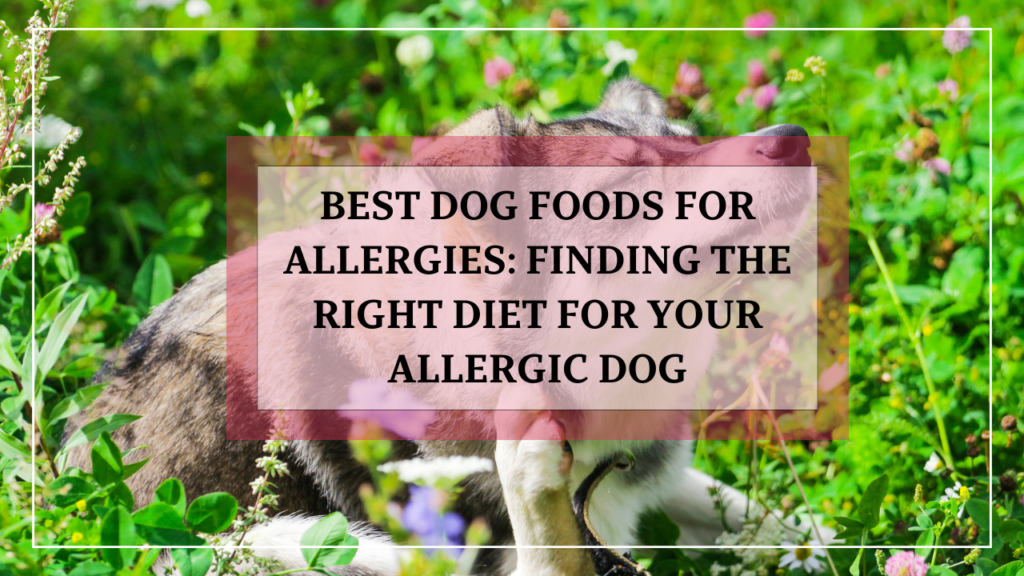Herbs have been used for centuries to promote health and healing in humans, but did you know that some herbs can also benefit our furry friends? In fact, many herbs dogs can eat are not only safe but offer a range of health benefits. Whether you’re looking to add a natural supplement to your dog’s diet, soothe minor ailments, or simply improve their overall well-being, herbs can be a great option.
However, not all herbs are safe for dogs. Some can be toxic, leading to digestive issues, organ damage, or worse. This guide will take you through everything you need to know about the herbs dogs can eat, their benefits, and how to safely introduce them to your pet’s diet. We’ll also cover herbs to avoid and how to use herbs for specific ailments.
By the end of this post, you’ll be equipped with the knowledge you need to enhance your dog’s health naturally.
Safe Herbs for Dogs to Eat
When it comes to incorporating herbs into your dog’s diet, knowledge is key. There are many herbs dogs can eat that can enhance their health, but it’s crucial to ensure that you’re selecting the right ones. Below, we’ll explore some of the safest and most beneficial herbs for dogs, including their uses and how to incorporate them into your pet’s meals.
1. Parsley
Benefits:
Parsley is not just a garnish; it’s packed with vitamins A, C, and K. It also contains essential oils that help freshen your dog’s breath and can aid in digestion.
How to Feed:
You can give your dog fresh or dried parsley, mixing it into their food. Just a sprinkle is enough for small dogs, while larger breeds can tolerate more.
2. Basil
Benefits:
Basil is an excellent source of antioxidants and has anti-inflammatory properties. It can also help combat bacteria and promote heart health.
How to Feed:
Fresh basil can be torn into small pieces and mixed into your dog’s food. You can also use dried basil in moderation.
3. Oregano
Benefits:
This herb is known for its antimicrobial properties, which can help protect your dog from harmful bacteria. Oregano is also a rich source of antioxidants.
How to Feed:
Both dried and fresh oregano can be used. A little sprinkle on their food is usually enough to reap the benefits.
4. Rosemary
Benefits:
Rosemary is a powerful herb with antioxidant properties. It can improve digestion and cognitive function, especially in older dogs.
How to Feed:
You can use fresh or dried rosemary, but make sure to chop it finely before adding it to your dog’s meals.
5. Thyme
Benefits:
Thyme is rich in vitamins A and C and has antifungal and antibacterial properties. It supports overall health and can aid in respiratory issues.
How to Feed:
Fresh or dried thyme can be sprinkled on your dog’s food. Just be sure to use it sparingly.
6. Dill
Benefits:
Dill can help soothe an upset stomach and freshen breath. It also has antioxidant properties.
How to Feed:
Fresh dill can be chopped and mixed into food or given as a tea. Avoid giving too much to prevent any digestive upset.
7. Mint
Benefits:
Mint is known for its ability to freshen breath and aid digestion. However, it should be used in moderation, as excessive amounts can lead to gastrointestinal upset.
How to Feed:
Fresh mint leaves can be given directly or mixed into food.
Table: Safe Herbs for Dogs
| Herb | Health Benefits | How to Use |
| Parsley | Freshens breath, aids digestion | Fresh or dried, sprinkled on food |
| Basil | Antioxidant, anti-inflammatory | Fresh or dried, added to meals |
| Oregano | Antimicrobial, rich in antioxidants | Fresh or dried, in small amounts |
| Rosemary | Antioxidant, cognitive support | Fresh or dried, chopped in meals |
| Thyme | Supports digestion, antifungal | Fresh or dried, sprinkled on food |
| Dill | Soothes stomach, freshens breath | Fresh or as a tea |
| Mint | Freshens breath, aids digestion | Fresh leaves, in moderation |
Case Study: The Impact of Herbs on Canine Health
A study conducted by the American Veterinary Medical Association (AVMA) investigated the health benefits of herbal supplements in dogs suffering from arthritis. The study found that dogs receiving a regimen that included turmeric and rosemary showed significant improvements in mobility and pain reduction compared to those on a placebo. This highlights not only the effectiveness of certain herbs but also their potential as complementary treatments in veterinary care.
What Are the Benefits of Giving Herbs to Dogs?
Herbs aren’t just for humans. They offer a wide range of health benefits for dogs, from improving digestion to reducing inflammation. Below are some of the key benefits of incorporating safe herbs into your dog’s diet:
1. Improved Digestion
Many herbs act as digestive aids. For example, parsley and dill help alleviate upset stomachs and bloating. Ginger is another herb that can soothe nausea and promote overall gut health.
2. Natural Anti-Inflammatories
Certain herbs, such as basil and turmeric, are known for their anti-inflammatory properties. These herbs can help manage joint pain and arthritis in older dogs, providing a natural alternative to medications.
3. Antioxidant Support
Herbs like rosemary and oregano are packed with antioxidants, which help fight off free radicals in your dog’s body. This can lead to healthier cells and a lower risk of chronic diseases, including cancer.
4. Calming Effects
For dogs that suffer from anxiety, herbs like chamomile and valerian root can help calm nerves. These herbs can be used during stressful situations like thunderstorms or car rides.
5. Boosts the Immune System
Some herbs, such as echinacea, are known for boosting the immune system, helping your dog fight off infections and viruses more effectively.
Table: Benefits of Common Herbs for Dogs
| Herb | Benefit | How to Use |
| Parsley | Freshens breath, aids digestion | Fresh or dried, sprinkled on food |
| Basil | Anti-inflammatory, antioxidant | Fresh or dried, added to meals |
| Oregano | Antimicrobial, supports respiratory health | Dried or fresh, in small amounts |
| Rosemary | Antioxidant, cognitive support | Fresh or dried, sprinkled on food |
| Dill | Soothes stomach, freshens breath | Fresh or as a tea, in moderation |
| Chamomile | Calming, reduces anxiety | As a tea or in small amounts with food |
| Echinacea | Boosts immune system | As a supplement or in tea |
Scientific Support for Herbal Benefits
Several studies back the use of herbs in animals. According to research published in the Journal of Veterinary Medicine, herbs like rosemary and oregano have been shown to have antimicrobial and antioxidant properties. These herbs can potentially extend a dog’s lifespan by reducing oxidative stress and fighting off harmful bacteria.
Herbs Dogs Should Avoid
While many herbs can provide health benefits to dogs, it’s equally important to be aware of the herbs that dogs should avoid. Some herbs can be toxic or cause adverse reactions, leading to serious health issues. Below is a list of harmful herbs, their effects, and what to do if your dog accidentally consumes them.
1. Garlic
Risks:
Garlic is part of the allium family, which also includes onions and leeks. It contains compounds that can be toxic to dogs, causing oxidative damage to red blood cells and leading to hemolytic anemia. Symptoms may include weakness, lethargy, vomiting, and abdominal pain.
What to Do:
If you suspect your dog has ingested garlic, contact your veterinarian immediately. Treatment may involve inducing vomiting and administering activated charcoal to prevent further absorption of toxins.
2. Onion
Risks:
Like garlic, onions are also part of the allium family and are highly toxic to dogs. They can cause similar symptoms of hemolytic anemia, including fatigue, decreased appetite, and dark-colored urine.
What to Do:
Immediate veterinary attention is required if your dog has consumed onions. Depending on the amount ingested, your vet may induce vomiting and provide supportive care.
3. Chives
Risks:
Chives are another member of the allium family and pose similar risks to dogs. They can cause gastrointestinal upset and damage to red blood cells, resulting in anemia.
What to Do:
If your dog eats chives, contact your veterinarian right away for guidance.
4. Nutmeg
Risks:
Nutmeg contains a compound called myristicin, which is toxic to dogs. Ingestion can lead to symptoms such as disorientation, increased heart rate, and potentially seizures.
What to Do:
If you believe your dog has consumed nutmeg, seek veterinary assistance immediately.
5. Wormwood
Risks:
Wormwood, commonly used in herbal remedies and some alcoholic beverages, can be toxic to dogs. It contains thujone, which can lead to seizures and other neurological issues.
What to Do:
If ingested, contact your veterinarian as soon as possible for evaluation and treatment.
6. Sage
Risks:
While small amounts of sage are generally safe, excessive consumption can lead to gastrointestinal upset and other adverse effects due to the presence of thujone.
What to Do:
If your dog shows signs of distress after eating sage, consult your veterinarian.
7. Tarragon
Risks:
Tarragon can cause gastrointestinal distress in dogs, leading to symptoms like diarrhea and vomiting.
What to Do:
If your dog consumes tarragon, monitor for any signs of discomfort and consult your vet if symptoms persist.
Table: Herbs Dogs Should Avoid
| Herb | Risks | Symptoms of Toxicity |
| Garlic | Oxidative damage, hemolytic anemia | Weakness, vomiting, abdominal pain |
| Onion | Hemolytic anemia | Fatigue, dark urine, decreased appetite |
| Chives | Hemolytic anemia | Similar symptoms as onions |
| Nutmeg | Neurological effects | Disorientation, increased heart rate |
| Wormwood | Seizures, neurological issues | Seizures, tremors |
| Sage | Gastrointestinal upset | Vomiting, diarrhea |
| Tarragon | Gastrointestinal distress | Diarrhea, vomiting |
What to Do if Your Dog Ingests a Toxic Herb
If your dog consumes any of the harmful herbs listed above, it’s crucial to act quickly. Here are steps to take:
- Stay Calm: Your dog will pick up on your anxiety. Keeping a level head will help you handle the situation better.
- Identify the Herb: If possible, identify what your dog has eaten. This information will help your vet assess the situation more effectively.
- Contact Your Veterinarian: Call your vet or an emergency animal clinic immediately. Be prepared to provide details about your dog’s size, the herb ingested, and the amount.
- Follow Vet Instructions: Your veterinarian may advise you to induce vomiting or may want you to bring your dog in for an examination.
- Monitor Symptoms: Keep an eye on your dog for any changes in behavior, appetite, or energy levels.
How to Safely Introduce Herbs to Your Dog’s Diet
Introducing herbs into your dog’s diet can provide various health benefits, but it’s essential to do so safely. Here are some guidelines to help you start the process:
1. Start Slowly
When adding any new food or ingredient, including herbs, it’s vital to introduce them gradually. Begin with a small amount of the herb and observe how your dog reacts. This cautious approach allows you to identify any potential allergies or sensitivities without overwhelming your dog’s system.
2. Monitor for Allergies or Sensitivities
Keep an eye out for any unusual reactions after introducing a new herb. Symptoms of allergies or sensitivities can include:
- Gastrointestinal Distress: Vomiting, diarrhea, or changes in appetite.
- Skin Reactions: Itching, redness, or rashes.
- Behavioral Changes: Increased anxiety, restlessness, or lethargy.
If you notice any of these symptoms, discontinue the herb immediately and consult your veterinarian.
3. Recommended Serving Sizes
Serving sizes can vary depending on your dog’s size, breed, and health status. Here’s a general guideline:
- Small Dogs (under 20 lbs): Start with 1/4 teaspoon of fresh herbs or 1/8 teaspoon of dried herbs.
- Medium Dogs (20-50 lbs): Begin with 1/2 teaspoon of fresh herbs or 1/4 teaspoon of dried herbs.
- Large Dogs (50 lbs and up): You can offer 1 teaspoon of fresh herbs or 1/2 teaspoon of dried herbs.
Remember to adjust the serving size based on your dog’s individual needs and tolerance.
4. Mixing Herbs into Food or as Supplements
- Food Mix: Chop fresh herbs finely and mix them into your dog’s regular food. Dried herbs can be sprinkled directly onto their meals. This method ensures your dog consumes the herb along with their regular diet.
- Herbal Supplements: If you’re considering herbal supplements, consult your vet for recommendations on safe and effective options. Always choose high-quality supplements from reputable sources.
Can Dogs Eat Herbal Teas?
Herbal teas can be a soothing and beneficial addition to your dog’s diet, providing various health benefits. Here’s what you need to know about herbal teas that dogs can safely consume.
1. Safe Herbal Teas for Dogs
Certain herbal teas can be beneficial for dogs, such as:
- Chamomile Tea: Known for its calming properties, chamomile can help relieve anxiety and promote relaxation.
- Ginger Tea: Excellent for digestion, ginger can help alleviate nausea and soothe an upset stomach.
- Peppermint Tea: This tea can aid in digestion and help freshen your dog’s breath.
2. How to Prepare and Serve Herbal Teas to Dogs
- Preparation:
- Boil water and pour it over a tablespoon of dried herbs or a few fresh leaves in a heat-safe container.
- Let it steep for 10-15 minutes.
- Strain the tea to remove the herbs and allow it to cool completely.
- Serving: You can serve herbal tea in a bowl or mix it with your dog’s food as a flavorful addition. Always ensure the tea is at a safe temperature before offering it to your dog.
Using Herbs to Support Common Dog Ailments
Herbs can be an excellent natural remedy for various dog ailments. Below are some herbs that may help support your dog’s health in specific areas.
Herbs for Digestive Health
- Parsley: Known to freshen breath and aid in digestion.
- Ginger: Effective for soothing nausea and digestive upset.
- Fennel: Can relieve bloating and gas, promoting overall digestive health.
Herbs for Anxiety Relief
- Chamomile: Offers calming effects and can help reduce anxiety.
- Valerian Root: Known for its sedative properties, it can promote relaxation.
- Passionflower: A natural anxiety reliever that can help calm nervous dogs.
Herbs for Joint Health and Inflammation
- Turmeric: Contains curcumin, known for its anti-inflammatory properties, which can help with joint pain.
- Basil: May reduce inflammation and provide antioxidant support.
- Rosemary: Offers anti-inflammatory benefits and can improve circulation.
Herbs for Immune Support
- Echinacea: Often used to boost the immune system and help fight infections.
- Oregano: Packed with antioxidants, it can help support overall health and immune function.
How to Grow Dog-Safe Herbs at Home
Growing your own herbs for your dog can be rewarding and cost-effective. Here are some benefits and tips for starting your herb garden:
1. Benefits of Growing Your Own Herbs
- Freshness: Homegrown herbs are fresher and free from harmful chemicals or pesticides.
- Cost-Effective: Growing your own herbs can save you money on store-bought options.
- Control: You can choose which herbs to grow based on your dog’s preferences and needs.
2. Tips for Starting a Herb Garden
- Choose Dog-Safe Herbs: Start with herbs like parsley, rosemary, basil, and cilantro, which are safe for dogs.
- Container Gardening: If you lack garden space, consider growing herbs in pots. This allows for easy access and mobility.
- Sunlight and Water: Ensure your herbs receive plenty of sunlight (at least 6 hours a day) and maintain consistent watering, allowing the soil to dry slightly between waterings.
3. Importance of Organic Growing Practices
When growing herbs, prioritize organic practices to avoid pesticides and harmful chemicals. Look for organic seeds or plants, and use natural fertilizers and pest control methods to maintain a safe growing environment for your dog.
Can Dogs Eat Spices? What’s the Difference Between Herbs and Spices?
While herbs and spices both add flavor to food, they come from different parts of plants and have distinct properties. Here’s a breakdown of the differences and which ones are safe for dogs.
1. Difference Between Herbs and Spices
- Herbs: Typically derived from the leafy green parts of plants (e.g., parsley, basil).
- Spices: Usually come from the seeds, roots, or bark of plants (e.g., cinnamon, ginger).
2. Safe and Unsafe Spices for Dogs
- Safe Spices:
- Turmeric: Anti-inflammatory and antioxidant properties.
- Cinnamon: Can help regulate blood sugar and has antifungal properties.
- Spices to Avoid:
- Nutmeg: Highly toxic and can lead to serious health issues.
- Black Pepper: Can cause gastrointestinal upset.
Frequently Asked Questions (FAQs)
1. Can Dogs Eat Fresh Herbs or Should They Be Dried?
Both fresh and dried herbs can be beneficial for dogs. Fresh herbs often contain higher moisture content and more potent flavors, while dried herbs have a more concentrated flavor. When using dried herbs, be mindful of the serving size since they are more potent than fresh ones.
2. How Often Should I Give My Dog Herbs?
Moderation is key. Herbs can be given as a supplement a few times a week, depending on the specific herb and your dog’s needs. Always consult your veterinarian for personalized recommendations.
3. Can Puppies Eat Herbs Too?
Puppies can eat herbs, but it’s essential to introduce them cautiously. Some herbs may not be suitable for very young dogs, so consult your veterinarian for guidance on safe options and serving sizes.
4. What Should I Do If My Dog Eats a Toxic Herb?
If you suspect your dog has ingested a toxic herb, take the following steps:
- Stay Calm: Your reaction can influence your dog’s behavior.
- Identify the Herb: If possible, determine which herb your dog has eaten.
- Contact Your Veterinarian: Call your vet or an emergency clinic for guidance.
- Monitor Symptoms: Keep an eye on your dog for any signs of distress and follow your vet’s instructions.

Hi, I’m Ali Tarek, the founder of Animalsman. I’ve always been passionate about pets, especially dogs and cats, and I created this website to share practical tips, easy recipes, and helpful care advice for fellow pet lovers. My goal is to make pet care simple, enjoyable, and accessible for everyone. When I’m not writing or curating content, you’ll usually find me spending time with my furry friends or learning new ways to keep them happy and healthy.



